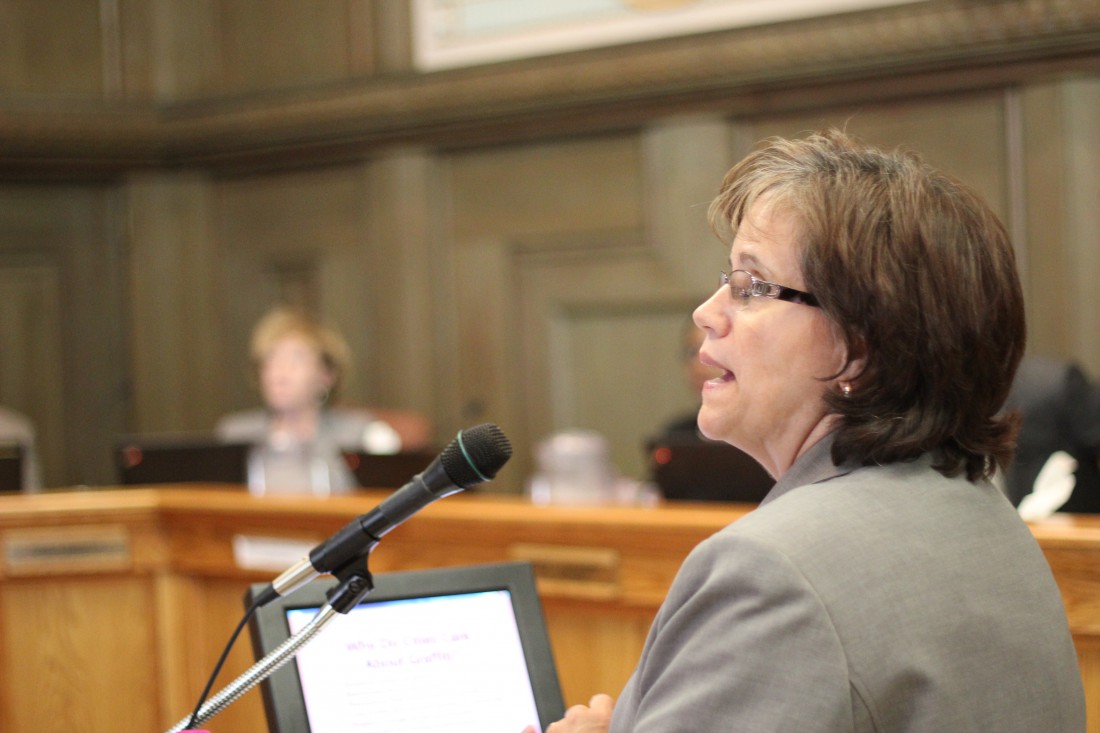Asheville’s controversial graffiti ordinance passed City Council during the April 22 meeting, with only Council member Cecil Bothwell voting against it.
Assistant City Manager Cathy Ball presented the ordinance to City Council and explained the proposed graffiti removal initiative.
“We live in a diverse community that has a lot of artists,” Ball said. “The reason that graffiti is a problem, even in Asheville, is that it devalues properties. It causes businesses to lose customers. It’s the perception that the community is unsafe. There’s a cost for removal. There’s also the negative impact [in that it looks like] we are not taking care of our community by doing maintenance.”
The graffiti removal initiative employs a three-step process, including escalating civil penalties for those arrested for graffiti, a 90-day intensive cleanup and a requirement for property owners to remove graffiti at their own expense after the initial 90 days.
Escalating fines, as initially suggested, increased for each offense within a 30-day period, but the 30-day period was removed and fines will now be cumulative up to $1,000 for the fifth and each subsequent violation.
Beginning July 1, the city will budget $300,000 to remove existing graffiti during a 90-day period, and, from that budget, pay 90 percent of the cleanup costs, but the city’s contribution will be limited to $500 per incident. The business owner will be responsible for the remaining 10 percent of the cleanup cost.
After 90 days, property owners will be responsible for 100 percent of the cost of removal, but the city will help put them contact contractors who will remove graffiti within 48 hours.
“The city has removed over 10,000 tags from public property [since 2007],” Ball says. She says the city spends more than $90,000 annually on graffiti cleanup and utilizes community service hours to do so.
Ball was quick to mention that failure to clean graffiti would not result in a fine for business owners: “We do recognize that they are the victims of the graffiti,” she says. “But, if we contact the property owner and they continue to refuse, then we do have the options available … to pursue that with legal action.”
That legal action, she said, could include taking a lien against the property as well as “a number a things I am not qualified to speak to.”
Councilman Bothwell opposed the ordinance. “I have trouble with the expenditure of taxpayer dollars to clean up private property,” Bothwell says, regarding the $300,000 of city budget going to the 90-day cleanup initiative.
Bothwell also suggested that the increase in fines for taggers will do little to reduce the number of offenses, saying, “People who don’t intend to get caught don’t worry about consequences,” and that, in other municipalities, fining property owners has had a “very positive effect” on getting them to comply with cleanup requirements.
Public comment prior to the vote was largely supportive, though several suggestions were proposed to give graffiti taggers an outlet, like a legal graffiti wall somewhere. Other concerns echoed Bothwell’s, with some community members saying there needs to be more focus on catching taggers in the act rather than trying to discourage them with fines.
Bob Roepnack, vice chairman of Asheville Greenworks, told Council of an anonymous donor willing to put up the 10 percent ($30,000) to match the city’s $300,000 budget for cleanup during the initial graffiti cleanup.
“He’s very concerned about getting some action on cleaning up graffiti started immediately,” Roepnack says about the donor.
Mayor Esther Manheimer asked Roepnack to thank the donor.
“We need to do something, and this is a great first step,” said Council member Gwen Wisler.
“By definition, graffiti is not authorized by the owner,” Wisler said about cleanup requirements. “So, nobody here is talking about art that the owner of the property has encouraged, or paid for or even loves once it’s up there.
“There is a line between vandalism and art,” she continues.
Bothwell remained unconvinced, and was the only dissenting vote.
“I think we’re doing something, but not necessarily anything useful with this ordinance,” Bothwell says.
Water deal
Also during the meeting, City Council voted to authorize Mayor Esther Manheimer to enter into an interlocal agreement with Henderson County regarding a 137-acre lot in the Bent Creek area owned by Henderson County that would otherwise be returned to Asheville ownership on July 15.
The interlocal agreement involves the sale of the property, with the proceeds split between Asheville and Henderson County. Asheville’s proceeds will go to Buncombe County for use in a public-safety purchase, and Henderson County’s will be used for the same. The deal does not require the proceeds be used for the same facility, but “there’s an ongoing dialogue with Buncombe County to try to work together, if at all possible, in sharing a joint facility,” said Manheimer.
“This also brings resolution to a longstanding, unresolved issue with Henderson County over the disposal of what we call the Bent Creek Property,” Manheimer says. “This is, I think, a great opportunity to do that.”
City Council voted unanimously for the agreement.
Other actions
For highlights of other actions taken by Council, City Clerk Maggie Burleson compiled this list. Click on it to view: aa4-22-14



Before you comment
The comments section is here to provide a platform for civil dialogue on the issues we face together as a local community. Xpress is committed to offering this platform for all voices, but when the tone of the discussion gets nasty or strays off topic, we believe many people choose not to participate. Xpress editors are determined to moderate comments to ensure a constructive interchange is maintained. All comments judged not to be in keeping with the spirit of civil discourse will be removed and repeat violators will be banned. See here for our terms of service. Thank you for being part of this effort to promote respectful discussion.